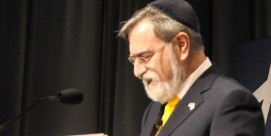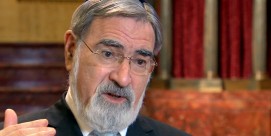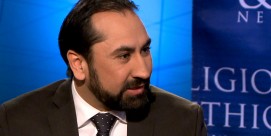In This Episode << SLIDE LEFT TO SEE ADDITIONAL SEGMENTS
The Right War Gone Wrong
by David E. Anderson
When it began eight years ago, the war in Afghanistan was the right war, the good war, the moral war.
In the wake of the 9/11 attacks on the United States, the effort to capture Osama bin Laden and other al-Qaeda leaders and to drive from power their Taliban protectors had the moral and ethical support of most Americans, as well as much of the international community. President George W. Bush laid out the rationale to Congress: “The leadership of al-Qaeda has great influence in Afghanistan and supports the Taliban regime in controlling most of that country. In Afghanistan, we see al-Qaeda’s vision for the world.”
It was a widely shared view. Michael Walzer, professor emeritus at the Institute for Advanced Studies in Princeton, New Jersey, and one of the foremost experts on just and unjust wars, called Afghanistan a “classic” case of the just war. The US Conference of Catholic Bishops issued a pastoral statement arguing for “the right and duty of a nation and the international community to use force if necessary to defend the common good by protecting the innocent against mass terrorism.”
“Afghanistan has been the West’s ‘good war’ until now,’’ wrote Michael Daxner, president emeritus of the University of Oldenburg in Germany, this summer in the World Policy Journal. “In recent history, there has rarely been another intervention with so much institutional legitimacy and so little questioning of strategy and perspective as there has been with Operation Enduring Freedom and the International Security Assistance Force [ISAF].” Daxner also served as special counselor to the United Nations mission in Afghanistan.
The initial military campaign in Afghanistan appeared to be a resounding success. A small band of American forces overthrew the Taliban in less than three months, drove them out of Kabul, and apparently had both the Afghan Taliban force and Osama bin Laden’s al-Qaeda on the run.
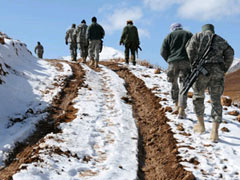 Photo: US Air Force |
But somewhere along the way Afghanistan got lost, its moral rationale muddied as the Bush administration quickly turned its focus to the unnecessary war, the morally unjustifiable war, the war against Iraq. The Afghanistan effort went astray, starved of resources and attention. It became, first, America’s forgotten war, and then a conflict beset with its own strategic and policy complexities as well as moral ambiguities.
Over the years, “as the mission has changed and become larger and more complex, these initial judgments have been subject to further consideration,” David Cortright, director of policy studies at the University of Notre Dame’s Kroc Institute for International Peace Studies, told an audience there on Sept. 1. As RAND Corporation political scientist Seth Jones has written in his recent book on the American experience in Afghanistan, In the Graveyard of Empires (Norton, 2009), “Despite the idealism of the initial campaign and the success of military operations, the United States squandered this extraordinary moment. … And by 2006, tensions in Afghanistan had “escalated dramatically and Afghanistan was leveled by a perfect storm of political upheaval in which several crises came together.”
Jones argues, and most experts seem to agree, that as US policy in Afghanistan drifted, Pakistan emerged as a sanctuary for the Taliban and al-Qaeda, allowing them to regroup and mount renewed and more widespread attacks. Afghan governance became “unhinged” with corruption, and “the international presence, hamstrung by the US focus on Iraq, was too small to deal with the escalating violence.”
Now US and coalition casualties continue to mount. The United States had lost more than 900 troops, and October was the deadliest month so far, with 59 American soldiers killed. British combat losses have crossed the 200 mark, and the battlefield situation is worsening as the Taliban and its insurgent allies are not only waging fierce resistance to the ISAF but also extending their control over increasingly large swaths of Afghanistan territory. The top US military officer, Navy Admiral Mike Mullen, chairman of the Joint Chiefs of Staff, told the Boston Globe in late August that the Taliban and its alliance with the al-Qaeda terrorist network are stronger than ever, and in other interviews he has characterized the military situation in Afghanistan as “deteriorating.”
Public opinion has also been turning against Obama’s “war we must win,” According to a new Washington Post-ABC News poll, 52 percent of respondents see the war in Afghanistan as not worth its costs, although 55 percent say they have confidence the president will choose a strategy that will work. In a Quinnipiac University poll released on November 18, American voters say 48 – 41 percent that fighting the war in Afghanistan is the right thing to do, down from 52 – 37 percent last month.
British public opinion is more skeptical. A poll published in the Aug. 29 Daily Telegraph found that 62 percent oppose British troops staying in Afghanistan. Only 26 percent favor remaining, and this month the Catholic bishop who heads the military diocese of Great Britain, speaking in a homily at a requiem mass for the fallen, urged resolution in Afghanistan “as speedily as possible.”
While conservatives and Republicans generally continue to support the war and call for more US troops for the effort—the Quinnipiac poll found 68 percent of Republicans think the United States is doing the right thing fighting in Afghanistan—some conservative pundits are beginning to turn against the effort. The columnist George Will, in a widely circulated Sept. 1 column, called on the US to begin “rapidly reversing the trajectory of America’s involvement in Afghanistan” and fight the war in such a way as to end US combat fatalities, suggesting US lives have been “squandered.” Will faulted both the goals and the strategy being pursued.
On the other side of the political spectrum, the antiwar movement that mounted a large but ultimately futile effort against the US invasion of Iraq is regrouping to challenge Obama, somewhat reluctantly, on Afghanistan. A wide variety of groups, including veterans’ organizations and coalitions of grass roots groups, such as Win without War and United for Peace and Justice, plan teach-ins, demonstrations, and lobbying at aimed raising questions about the cost of the war.
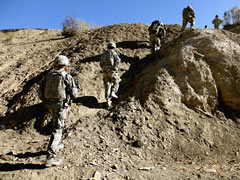 Photo: U.S. Army Staff Sgt. Andrew Smith |
Religious voices and ethical questions are also being raised. This month, a group of 77 United Methodist bishops signed a letter to the president calling for a timetable for the withdrawal of all forces and saying there is no path to military victory in Afghanistan. An open letter from a range of progressive religious leaders led by evangelical Christian activist and Sojourners magazine editor Jim Wallis called for a “humanitarian and development surge” in Afghanistan and exhorted the president to “let the nonmilitary strategies lead the way.” Last month, the US Catholic bishops sent a letter to the president’s national security advisor, General James. L. Jones, urging the administration to review its use of military force “to insure that it is proportionate and discriminate” and to “develop criteria for when it is appropriate to end military action in Afghanistan.”
In a recent issue of Commonweal, the independent and lay-edited Catholic review of religion, politics, and culture, Boston University history and international relations professor Andrew Bacevich wrote in a piece entitled “The War We Can’t Win: Afghanistan and the Limits of American Power” that “fixing Afghanistan is not only unnecessary, it’s also likely to prove impossible.” As for what the US should do, Bacevich suggests that “a sense of realism and a sense of proportion should oblige us to take a minimalist approach,” adding that “we can’t eliminate every last armed militant harboring a grudge against the West. Nor do we need to.”
The mainline Protestant journal Christian Century editorialized in its Sept. 8 issue that “it is time to ask: What is the U.S. mission in Afghanistan and how does it serve peace in the region and the American interests?” America, the national Catholic weekly magazine published by the Jesuits, asked earlier this month about Afghanistan, “What are we achieving there? Do we have the ruthlessness and patience to stay in this fight? With our nation printing money to pay its bills, can we really afford to maintain this long war?” “Nothing about the mission in Afghanistan is clear,” concluded a Sept. 25 Commonweal editorial, “least of all its connection to American security. All wars, including necessary wars, involve difficult choices. If President Obama chooses to keep us in Afghanistan, he must do a better job of explaining his reasons and expectations to the American people—especially to the families of soldiers serving there. He can no longer ask Americans to assume that saving Afghanistan from the Taliban is the same thing as saving American from Al Qaeda.”
The Rev. John Langan, SJ, a professor of philosophy and Catholic social thought at Georgetown University, first posed the question of “whether we’re making real progress toward morally important goals” eight years ago in a 2001 interview with Religion & Ethics NewsWeekly, just one month after the US bombing of Afghanistan had begun. Today he says the answer to that question is no. Even when explicit consideration of just war ethics seems absent from current strategic debate, says Langan, “a lot of ethical issues are present in policy planning,” especially questions about whether our goals are attainable and worth pursuing. “I wish,” says Langan, “I was seeing a debate about what is worthwhile versus are we meeting the demands of the generals.” On this point, he says, he sees parallels with Vietnam and what he calls “a deeply ingrained tendency in the military that if a problem resists us, bring more resources to bear and we will prevail.” In Afghanistan, he observes, “we are forced to fight in cautious and disagreeable ways,” and “we never get very far from the possibility of tragedy.”
Howard Rhodes, a religious studies professor at the University of Iowa, teaches a course every fall on war and peace in Western religious thought. The lack of informed public debate about Afghanistan in just war terms, he suggests, is because “Christian churches and their representatives are largely incapable of articulating how those debates might look,” and “ordinary people in churches are not well prepared to be engaged” in them. Our weakened just war discourse, he adds, “reflects the pressure of pacifism” and an “erosion in ordinary citizens’ ability to engage in any discourse other than protest.”
Yet moral issues remain inextricably bound up with our broad strategic and political debates, says Rhodes. For him, the most disturbing characteristic of the current moment is that the US is “profoundly unclear” about the kind of world it is using its power to bring about and “extremely unclear about what war is for.”
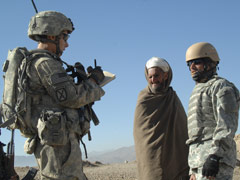 DoD photo by Sgt. 1st Class Leonardo Torres, U.S. Army |
Duke University ethicist Stanley Hauerwas, a Christian pacifist, has spoken about Afghanistan in similar terms. In an interview earlier this month, he told Religion News Service that “it’s still not clear what we’re fighting for. It’s so deeply ambiguous that it’s hard to fit into just war criteria. The very idea that you begin to assess the justness of a war after the war is already going to happen, I’m sorry, it’s already too late.”
Rhodes says he expects President Obama to go some distance to meet his military advisors’ requests. “All the options are bad,” says Rhodes, “and for the next year the least bad option” is to give General Stanley McChrystal, the top commander of US troops in Afghanistan, “as much of what he’s asking for as is tolerable.” McChrystal has made clear again and again that the United States and its allies, facing a serious and deteriorating military situation on the ground, must essentially start over. This will involve not only a new strategy but also a new effort to make the moral and political case for what President Obama has called “the necessary war’’ to the American people, the people of the allied nations in the NATO coalition and, not least, the Afghan civilian population.
“The situation in Afghanistan is serious, but success is achievable and demands a revised implementation strategy, commitment and resolve, and increased unity of effort,’’ McChrystal said in an Aug. 31 statement as he sent up the chain of command a confidential assessment of the nearly eight-year-old war asked for by Obama when he put McChrystal in charge of the faltering effort in Afghanistan. Three weeks later, the assessment was leaked to the Washington Post, including its warning that without more forces the conflict “will likely result in failure.” Throughout much of the fall, Obama has convened his national security and military advisors for a series of strategy sessions about means and ends and whether to add more US combat forces to the battle. At the end of this year there will be some 68,000 US forces in Afghanistan and another 40,000 NATO troops from US allies such as Great Britain, Germany, and Canada.
At the September event at Notre Dame (and again in the October 19 issue of America in an article reassessing US engagement in Afghanistan), David Cortright argued that as presently constituted the Afghanistan effort, even if originally a just cause, fails under the just war criteria of last resort and probability of success, and he made a two-point challenge to current policy, even as refined and redefined by Obama and McChrystal.
“I would argue, and many did even at the beginning of the US military mission, that war is an inappropriate means of countering al-Qaeda so that the fundamental strategic assumption [of U.S. policy] … is subject to debate,” he said. “War is not an instrument that can be used to counter non-state terrorist networks,” he suggested. “It also has many detrimental, unintended harmful consequences.” He cited as an example that war treats “mass murderers as if they were soldiers, thus inadvertently raising the credibility and moral stature of these criminals.”
In his second challenge, Cortright asked why we are at war with the Taliban and argued, as do others, that the strategic assumption lumping together the Taliban and al-Qaeda as inseparable and indistinguishable is wrong. Furthermore, al-Qaeda’s influence in Afghanistan is waning while the Taliban’s is gaining. He suggested, following the argument of Fotini Christia and Michael Semple in their article “Flipping the Taliban” in the July/August 2009 issue of Foreign Affairs, that US policy must have a “political ‘surge,’ a committed effort to persuade large groups of Taliban fighters to put down their arms and give up the fight.”
Christia and Semple say Obama’s new Afghanistan strategy, as announced in his March 27 speech and a six-page White House white paper, acknowledged that integrating reconcilable insurgents will be a key component of US policy. “Yet US policy makers have not adequately developed a vision of how to achieve reconciliation,” they write. “Admitting their lack of knowledge about the precise character of the insurgency, they equate reconciliation with merely cajoling Taliban foot soldiers into crossing over to the US side.”
It is an argument that has won the support of the Christian Century, whose editors have concluded that “working to reconcile the Taliban with the broader interests of the Afghan nation calls for respecting the interests of local Taliban leaders. They are not a monolithic group.”
As the Obama administration seeks to devise a means to implement the McChrystal recommendations—or not, it comes under close scrutiny from politicians and other observers. Noting the failed efforts of past powers, from Alexander the Great to Great Britain and, most recently, the Soviet Union, to subdue Afghanistan, the Christian Century editorial put it bluntly: “To avoid another catastrophe, the president must be held to a clear strategy and a short timeline.”
David E. Anderson is senior editor at Religion News Service. He wrote last year for Religion & Ethics NewsWeekly on “God and Empire.”



